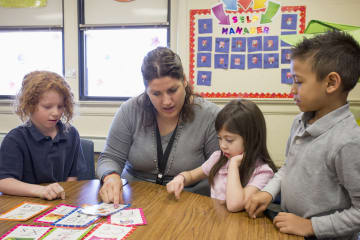
What is autism spectrum disorder (ASD)?
Autism spectrum disorder (ASD) is a developmental disorder. It affects a person's behavior. And it makes communication and social interactions hard.
ASD can range from mild to severe. The type of symptoms a person has and how severe they are varies. Some children may not be able to function without a lot of help from parents and other caregivers. Others may learn social and verbal skills and lead independent lives as adults.
Most people with ASD will always have some trouble when they communicate or interact with others. But finding and treating ASD early has helped many people who have ASD to lead full lives. They can do things like go to college and work.
ASD now includes conditions that used to be diagnosed separately. These include:
- Autism.
- Asperger's syndrome.
- Pervasive developmental disorder.
- Childhood disintegrative disorder.
You or your doctor might use any of these terms to describe the condition.
What are the symptoms?
People with ASD have some symptoms in these areas:
- Communication and social interactions.
-
Symptoms may include:
- A delay in learning to talk. Or the person may not talk at all.
- Problems using or responding to gestures or pointing, facial expressions, and body posture.
- Problems making eye contact.
- A lack of interest in sharing enjoyment, interests, or achievements with others.
- Repetitive behaviors and limited interests in activities or play.
-
Symptoms may include:
- Body rocking and hand flapping.
- Getting attached to objects or topics.
- A need for sameness and routines.
How severe the symptoms are varies.
In most cases, symptoms are noticed by the time a child is 2 years old. But if symptoms are severe, they may be seen as early as age 12 months.
How is ASD diagnosed?
Doctors use screening questions, exams, and tests to see how your child behaves and interacts with others. Talk with the doctor about what you've seen. The doctor will use all this information, along with his or her judgment, to assess how your child is developing and look for signs of ASD.
The doctor will ask questions about your child's development. If your doctor thinks your child may have ASD, he or she may send you to a specialist.
A specialist will:
- Ask about your child's health history.
- Do a physical exam.
He or she will also:
- Ask about how your child behaves and interacts with others.
- Watch how your child interacts with others and behaves when playing or doing a task.
This can help you know if your child has ASD. Or you can find out if your child has a different problem. This could be a language delay or ASD and another condition.
How is it treated?
Treatment for ASD may involve behavioral training. There are different programs that can help your child. Some start early in your child's development. Many are based on applied behavior analysis (ABA). This method rewards appropriate behavior to teach children social and other skills. Some examples include the Early Start Denver Model (ESDM) and Pivotal Response Training (PRT).
Treatment may also include structured teaching. This involves organizing a child's day and school setting to help a child learn new skills.
Certain methods, like modeling behavior, may be used. With modeling, a child with ASD learns a skill or desired behavior by watching others.
Some children may need speech or physical therapy. This can help improve communication and motor skills. They may also need medicine. These might be used to treat symptoms of ASD, including being cranky or hyperactive. Medicine also is used to treat other problems, like anxiety or depression.
Where can you learn more?
Go to http://www.healthwise.net/patientEd
Enter A239 in the search box to learn more about "Learning About Autism Spectrum Disorder (ASD)".
Current as of: July 31, 2024
Author: Ignite Healthwise, LLC Staff
Clinical Review Board
All Ignite Healthwise, LLC education is reviewed by a team that includes physicians, nurses, advanced practitioners, registered dieticians, and other healthcare professionals.

